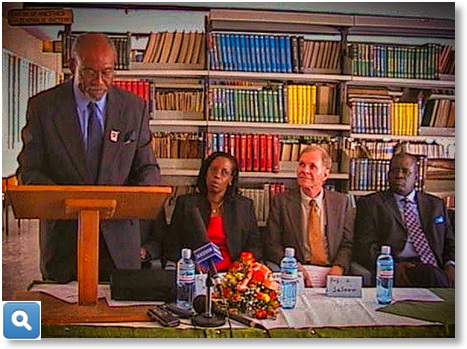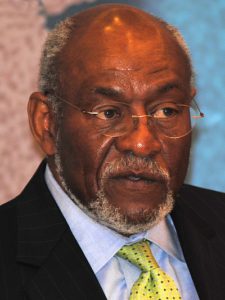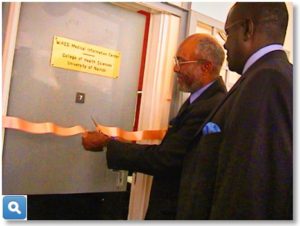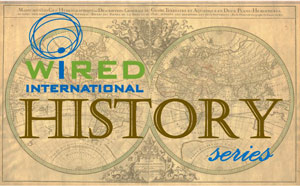In celebration of our 25th anniversary, WiRED is pleased to bring you stories from our archives. These articles provide a glimpse of WiRED’s early work as they depict the places and the projects we have focused on over the years.
With funding support from the U.S. National Institutes of Health, WiRED set up 24 Community Health Information Centers across Kenya. In addition to those public access facilities, we installed the first Medical Information Center (MIC) at the University of Nairobi School of Medicine, the country’s largest medical school. At a time when few people had their own computers and no one owned smartphones, this first-of-a-kind computer facility opened doors to research and study never before available to medical professors and students at the university.
The following pieces describe the ribbon cutting of the MIC and offer the text of speeches by U.S. Ambassador to Kenya, Johnny Carson, and WiRED’s director, Dr. Gary Selnow.
U.S. Ambassador to Kenya to Dedicate Medical Information Center at the University of Nairobi
U.S. Ambassador to Kenya, Johnnie Carson, will join WiRED International for the opening of a new Medical Information Center at the University of Nairobi Faculty of Medicine on February 4, 2003. “The Ambassador’s participation highlights growing international recognition of the crucial connection between access to information and the health of developing nations,” says WiRED Executive Director Dr. Gary Selnow. “We are honored that Mr. Carson will join us for this important event. This computer facility–the first available in Kenya’s largest medical school-will enable students and faculty to access information that has, to date, been beyond their reach.
The Center will make critical information technology available to Kenyan doctors and medical students for the first time, providing them with essential education and research tools to address the ravages of HIV/AIDS and other health care issues. It will feature ten computer workstations, WiRED’s medical e-library, and Internet connectivity.
 This is a natural extension of WiRED’s ongoing work, which provides comprehensive information and communication resources to communities in Kenya. . A country-wide Health Care and HIV/AIDS Information Network will soon link the university with the local Centers. This network will accommodate student and faculty lectures, research and other field activities to strengthen the study and the practice of medicine. Further, it will improve the information available to health professionals in the field and form a cohesive, medical network among Kenya’s provinces and its leading university. Recent data revealed that 94% of healthcare professionals in the communities served receive at least 50 percent of their medical information from a WiRED Center, while 22% said they got “nearly 100 percent” of their information from a Center. In 2003, WiRED will expand the number of Centers serving local communities.
This is a natural extension of WiRED’s ongoing work, which provides comprehensive information and communication resources to communities in Kenya. . A country-wide Health Care and HIV/AIDS Information Network will soon link the university with the local Centers. This network will accommodate student and faculty lectures, research and other field activities to strengthen the study and the practice of medicine. Further, it will improve the information available to health professionals in the field and form a cohesive, medical network among Kenya’s provinces and its leading university. Recent data revealed that 94% of healthcare professionals in the communities served receive at least 50 percent of their medical information from a WiRED Center, while 22% said they got “nearly 100 percent” of their information from a Center. In 2003, WiRED will expand the number of Centers serving local communities.
WiRED, which often collaborates with San Francisco State University’s Marian Wright Edelman Institute and with the U.S. State Department-sponsored Global Technology Corps–now operates Centers in the Balkans, Africa and Latin America.
Amb. Carson’s Speech at the Ribbon Cutting
US Ambassador Johnnie Carson dedicated WiRED’s Medical Information Center at the College of Medical Sciences of the University of Nairobi. This is the full text of U.S. Ambassador Johnnie Carson ‘s speech at the dedication ceremony.
I’m delighted to be here today for the opening of this Health Information Centre at the College of Medical Sciences of the University of Nairobi. I want to congratulate the staff of the WiRED project, Professor Gary Selnow and Pauline Karani, for their hard work in setting up this center, and I especially want to thank Professor Makawati, the Dean of the Faculty of Medicine, for the support and guidance given to this project.
It is sometimes said that more information has been developed in the last 20 years than in the preceding 2000 years. Some people even assert that we have a doubling of information every three years. There is no field where the explosion of information has been as great is in the field of medicine. Doctors who went to medical school 25 or 30 years ago find that much of what they learned has been overtaken by new discoveries and findings.

As a result of this information explosion, it is extremely important for medical students and their faculty to have access to the most up-to-date research findings and new information in their fields. This computer center, with its CD library and internet access, will enable the future doctors, nurses, and dentists of Kenya to be as well informed as their counterparts in the rest of the world.
WiRED has already been providing similar services to doctors and health workers in their five centers in other parts of the country. Their evaluation research found that 95% of health professionals who came to the centers said that they got at least 50% of their medical information from the Community Health Information Center. About half of these health workers said that they got about 75% of their medical information from the center. This shows not only the need that exists for up to date medical information, but also the important role that this project and these centers can have in keeping medical workers informed.
I’ve also been pleased to learn that there are interactive programs to give information about HIV prevention. I hope that the medical students who come to this center take advantage of these programs for their own benefit as well as for their patients. In many countries in Africa, including Kenya, doctors, nurses, and other health workers are dying of AIDS at the same rate as their fellow citizens who are not health workers, and in some cases, their death rate is even higher. Although there are some cases of health workers acquiring HIV through occupational exposure, most research evidence suggests that it is their personal behavior which puts health workers at risk of HIV infection. It is a personal, family, and national tragedy when a young health worker dies of a preventable disease. Kenya needs all of their health workers to remain healthy and able to care for their fellow citizens. So I challenge all the medical, nursing, and dental students to use the resources of this center, not only to advance your professional knowledge, but also to acquire knowledge and skills to help you avoid getting infected with HIV, and to serve as an example to others.
One of the HIV prevention programs which I have supported actively for more than 10 years is voluntary counseling and HIV testing, or VCT. I had the privilege of opening the second VCT center in Uganda in 1992. The slogan of this VCT program in Uganda is: “Knowledge is Power.” In the case of VCT, the slogan refers to the power that is gained by learning new information about HIV and especially learning one’s HIV status. I think this slogan can also be applied to this center, as the knowledge gained by medical students will make them more effective and powerful health workers. This knowledge will also empower them to avoid risky behavior both on and off the job.
My wife Anne is a librarian, and she recently had the opportunity to visit the WiRED Community Health Information Center in Kisumu. She was very impressed with what she saw, both in terms of the service of the center to health workers and to the general community. She observed a group of young students learning from the interactive HIV prevention program. I am informed that this center here at the University of Nairobi will be linked to the other WiRED centers in Kenya, including the one Anne visited in Kisumu. I hope that this will encourage exchange of information between Nairobi based health professionals and their counterparts in other regions of the country. Especially in the field of AIDS, it is imperative that the information and services available to health workers and citizens in Nairobi become available to all Kenyans.
An unusual feature of this project is that the first five centers were established outside of Nairobi, as most new innovations are first introduced in Nairobi and then eventually become available elsewhere. I want to thank WiRED for understanding the importance of making sure that people in other parts of the country have access to these centers as well, and I’m very pleased to learn that WiRED now intends to open additional centers in other parts of the country.
In conclusion, I want to say something about this center in relation to our two nations. First, it seems that the image of the US often focuses on our military and economic power. This center, and the WiRED program in general, is a demonstration of another type of power-the power of knowledge and information. I’m proud that the US is a world leader in the area of information and knowledge power-and I’m delighted that WiRED is helping in the effort to share this with the people of Kenya. In the long run, this form of empowerment, the sharing of the power ofinformation, is more important than any other form of power in the 21st century.
Secondly, I also want to applaud Kenya for the recent election. The openness that characterized the election, and the openness being demonstrated by the new administration, is a very positive model for other African nations. In the same way, this center, and the Community Health Information Centers that will be spreading throughout Kenya, can also serve as a model for other countries. We have already received requests from a team in Zimbabwe who wish to open similar centers, and want to learn from the Kenya experience. So there is an opportunity for Kenya to provide regional leadership in the expansion of this very important project to extend access to computer based learning in the health field.
Once again, let me congratulate everyone who has worked hard to make the opening of this center a success. Allow me to thank you in advance for your continued work and commitment to making this center an effective and powerful resource for the students of the University of Nairobi College of Health Sciences.
Congratulations!
Gary Selnow’s Speech at the Ribbon Cutting
University of Nairobi
College of Health Sciences
Opening of WiRED Medical Information Center
Gary W. Selnow
Executive Director, WiRED
Thank you Dean Makawiti.
I would like to begin with a word of thanks to the many people who have contributed to this Medical Information Center that we are dedicating today, and to the Community Health Information Center work that has been ongoing in Kenya for more than a year. I am especially indebted to the volunteers in the U.S. and to the dozens of people here in Kenya who have made this work possible. I especially want to thank WiRED’s Country Director, Pauline Karani, and my good friend, Natasha Martin, for their extraordinary efforts on behalf of this project. I would like to thank Elizabeth Marum, at CDC, for her arrangements with today’s activities. I also want to thank the University of Nairobi officials assembled at this table for their vision and for their support of this Center which today will be placed into service for the students and faculty at this College of Health Sciences.
Two years ago we had the idea to use computer technology to deliver information about HIV/AIDS to the people of Kenya. WiRED’s work elsewhere had demonstrated the power of information, and it is our belief that information is essential in confronting the HIV/AIDS plague: before people tackle the problem, before they change attitudes and alter behaviors, before they address their own health concerns, they need information. Information is direction, information is motivation, information is encouragement, indeed, as has been said many times, information is power.
The Community Health Information Center concept we put in place more than a year ago, is based on a simple idea: Provide grassroots communities with information about HIV/AIDS and other health care topics. Offer this information in an interesting and useful format and provide assistance to help people use the information to their best advantage. The idea works because it puts in place the information and a support system to help people access it.
In January of last year, we installed five Community Health Information Centers around Kenya: Kilifi, Kajiado, Kiambu, Kisumu and Butula. Each Center has four computers, a trained staff of five and an extensive CD-ROM collection of HIV/AIDS and other health topics spanning a broad range of human medicine from Asthma to Zoonoses. We focus on delivering information to medical professionals, primary care givers, young people, and for more than 50 hours per week, we open the doors to everyone in the community. People come in groups, sometimes they come alone; they come because they are concerned and sometimes frightened, but they all come because they are interested in getting information and in learning.
Research from the test year shows clearly that the Center concept is extraordinarily effective in disseminating health care information to people at the grassroots. Tens of thousands of people use these facilities. In addition to the expected groups–the physicians and nurses, care givers and youth–we have been delighted to see a broader set of audiences coming regularly to the Centers.
I’ll never forget walking into the Center in Butula and seeing more than a dozen traditional healers and birth attendants who were listening to a local nurse translate information from one of the HIV/AIDS disks. They sat in rapt attention in front of the computer monitor as they learned about the illness and discovered how to protect themselves from infection in the course of their work. For instance, as a results of their study at the Center, the birth attendants now require women in the last months of their pregnancy to keep with them rubber gloves and disinfectant to be used in the course of delivery.
The birth attendants continue to come to the Center twice a week as they examine the information available on more than 120 CD-ROMS.
Some of the other important groups to use the Centers have been young people and teachers. Our Centers have formed alliances with nearby schools and regularly hold interactive classes on HIV/AIDS and other health topics. Visit a Center and you’re almost certain to see a group of 20 or more young people answering questions as trainers take them through specially designed CDs. In the past year, many thousands of students have attended these Centers.
But, why use computers you ask? Well, lots of reasons:
- First, they stock entire libraries on a desktop (in this little case, we have the content of many thousands of books);
- Computers deliver information at a fraction of the cost of books, and CDs are easily shipped;
- Computer files are quickly updated, so information stays current;
- Computers provide a special attraction especially to youth (for a child, two hours with a book is an eternity, two hours with a computer is but a moment);
- Computers are interactive for more effective communication;
- And a fringe benefit—this project introduces technology to tens of thousands of young people to help this generation compete in the global marketplace.
 Yes, computers have many advantages, but there is something they lack and that’s where our staff members come in. This test year confirmed that the Centers are about more than computers. Technology starts the process with a promise: information. That gets people in the door. Then the local staff members—the hearts and souls of the Centers—take over. They talk with the visitors to learn their concerns, and then suggest information that may be of greatest help. When necessary, staff members translate and explain the material on the CDs, and when the situation calls for it, they listen and advise, encourage and support. At times, they’ll suggest counseling with professionals. The staff members promote testing, they teach, cajole, assist and sympathize. They are the indispensable human elements in this information delivery system.
Yes, computers have many advantages, but there is something they lack and that’s where our staff members come in. This test year confirmed that the Centers are about more than computers. Technology starts the process with a promise: information. That gets people in the door. Then the local staff members—the hearts and souls of the Centers—take over. They talk with the visitors to learn their concerns, and then suggest information that may be of greatest help. When necessary, staff members translate and explain the material on the CDs, and when the situation calls for it, they listen and advise, encourage and support. At times, they’ll suggest counseling with professionals. The staff members promote testing, they teach, cajole, assist and sympathize. They are the indispensable human elements in this information delivery system.
In the year that these centers have been in operation, they have rapidly become community fixtures as schools, libraries, meeting places, support centers, referral stations, regional HIV/AIDS and health resource hubs. They start with the promise of information and follow up with a support system necessary to place information into the hands of the people, and to help the people apply this information to change behaviors and improve their health.
Here, at the beginning of 2003, we are embarking on significant additions to the network, inspired by the lessons from our test year. Perhaps the most significant element is this Medical Information Center we are opening today. This computer facility will enable students and faculty at the College of Health Sciences to access–through an extensive CD-ROM collection and the Internet—an extraordinary amount of current information available to the medical community around the world.
It will enable them to communicate directly with colleagues in any part of the globe and allow them to access the richest, most extensive medical databases anywhere. This facility will familiarize Kenya’s future medical professionals with computer-based information, and when they become practicing physicians, dentists and nurses throughout the country, enable them to step into any of WiRED’s Centers in Kenya for updated, medical information. This university Center and the field Centers will stock identical databases—updated every six months. That’s the equivalent of thousands of medical books, journals and conference proceedings available with a few key strokes.
We envision a country-wide Health Care and HIV/AIDS Information Network that will link the university with the local Centers. This network can accommodate student and faculty lectures, research and other field activities to strengthen the study and the practice of medicine. Further, it can improve the information available to health professionals in the field and strengthen the medical network among Kenya’s provinces and its leading university.
In addition to these exciting possibilities, we’re putting in place this year a variety of programs to expand the reach and the impact of this information network. To begin, with backing from supporters such as the U.S. National Institutes of Health and the Global Technology Corps at the U.S. State Department, we’re expanding to 18 the number of field Centers.
With possible collaboration with the CDC–the Center for Disease Control–in each Center, we’re expanding the outreach programs. Several times per week, two staffers will take a “Pack ‘n Go” computer on the road to locations far from the Centers. They’ll set up day-long activities in rural schools, churches and other organizations and support VCTs wherever possible. The Centers will also focus on special-interest groups such as the military, taxi drivers and boda bodas whose HIV rates are exceptionally high. In addition, we will create our own CDs to configure information specifically for local audiences.
We’ll test a special information program for disabled people, initiate a newsletter to further disseminate the most often-accessed topics and put in place other activities that bear on the simple concept that information is key to good health care.
It starts with the capacity of the Center we are dedicating today to provide Kenya’s medical students and faculty the very latest technical information, and it continues with a network rich with information for the many varied audiences throughout the country.
We at WiRED are pleased to be a part of this program and look forward to helping provide professionals and ordinary people alike with the information they need to combat HIV/AIDS and to live healthy, productive lives.
Several years ago, WiRED’s Executive Director, Dr. Gary Selnow, wrote a series of essays about some of our early programs. The following piece looks at WiRED’s work in Kenya, including a description of a Medical Information Center we provided to the University of Nairobi School of Medicine.
WiRED’s Medical and Health Education Work in Kenya — From the Leading Medical School to Remote Villages
BY WIRED DIRECTOR GARY SELNOW, PH.D.

Preamble
Early in 2003 WiRED International launched a Medical Information Center (MIC) in the Faculty of Medicine at the University of Nairobi. U.S. Ambassador to Kenya, Johnnie Carson, gave the keynote speech during which he discussed the power of information. I’ll get to that in a minute, but first I would like to tell a brief story about an incident that took place during the ribbon-cutting ceremony.




